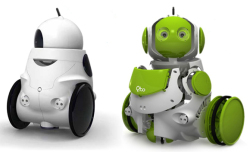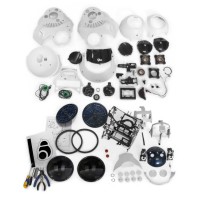Q.bo open source robot now available to pre-order

![]() Q.bo moves on two wheels and can turn its head, which has built-in web cams
Spanish company TheCorpora is now accepting pre-orders for its Q.bo open source and open hardware robot. TheCorpora founder Francisco Paz spent several years working on the rolling robot, which is about 45 cm tall and can be used both in research and around the home.
Q.bo moves on two wheels and can turn its head, which has built-in web cams
Spanish company TheCorpora is now accepting pre-orders for its Q.bo open source and open hardware robot. TheCorpora founder Francisco Paz spent several years working on the rolling robot, which is about 45 cm tall and can be used both in research and around the home.
The Q.bo Basic Kit is currently priced at €499 for the first 1,000 units, but will later go up to €623.75. It includes all mechanical components, the housing and the controller boards as a self-assembly kit. However, it doesn't include sensors and PC components; these are part of the Q.bo Complete Lite kit for €1,699; the fully assembled Q.bo Complete Pro robot costs €2,299 – the prices for these will increase to €2,123.75 and €2,873.75 respectively after the first 1,000 units are sold.

![]() The Q.bo Basic Kit - some assembly required
An Intel Atom Mini-ITX motherboard is used to run the OpenQbo distribution based on Ubuntu 11.10 "Oneiric Ocelot" and a pre-installed ROS robot operating system by Willow Garage. The Julius software handles speech recognition, and Festival is used for speech output. At a later stage, the developers plan to equip the robot with an ASUS Xtion PRO Live 3D sensor that, like Microsoft's Kinect, allows depth images to be generated; however, the ASUS sensor can currently only be purchased by developers.
The Q.bo Basic Kit - some assembly required
An Intel Atom Mini-ITX motherboard is used to run the OpenQbo distribution based on Ubuntu 11.10 "Oneiric Ocelot" and a pre-installed ROS robot operating system by Willow Garage. The Julius software handles speech recognition, and Festival is used for speech output. At a later stage, the developers plan to equip the robot with an ASUS Xtion PRO Live 3D sensor that, like Microsoft's Kinect, allows depth images to be generated; however, the ASUS sensor can currently only be purchased by developers.
Apps created by the developers to, for example, provide facial recognition or object tracking functionality, can be installed on the robot. Integrated LED panels allow Q.bo to simulate a certain degree of facial expression. This feature attracted attention several months ago, when the developers built an app that allows the Q.bo to recognise other Q.bos by the different flashing patterns of their LEDs. According to the blog, Q.bo can also recognise itself in a mirror by its flashing lights.
Aside from the PC components, the developers have released both the software and the hardware under open source licences. The wiring diagrams make it easy to recreate, for example, the controller boards. One of the central boards is based on an Arduino Duemilanove microcontroller board.
(crve)
![Kernel Log: Coming in 3.10 (Part 3) [--] Infrastructure](/imgs/43/1/0/4/2/6/7/2/comingin310_4_kicker-4977194bfb0de0d7.png)

![Kernel Log: Coming in 3.10 (Part 3) [--] Infrastructure](/imgs/43/1/0/4/2/3/2/3/comingin310_3_kicker-151cd7b9e9660f05.png)
















